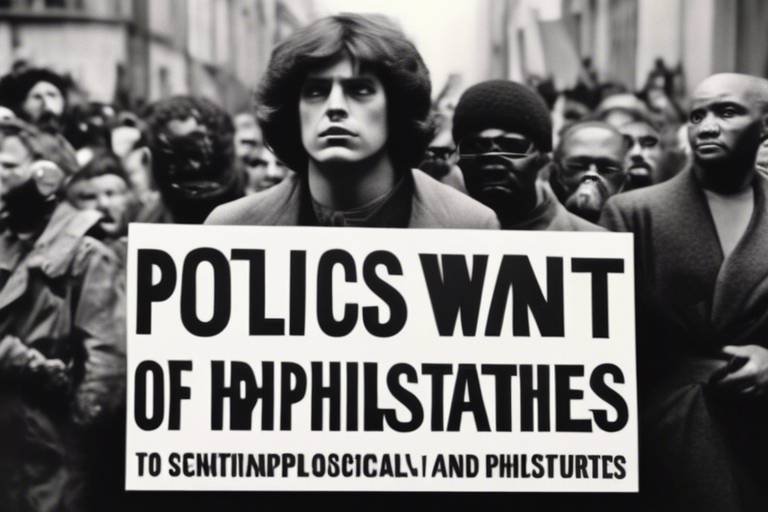The Moral Dimensions of Political Philosophy
The intricate relationship between morality and political philosophy is a fascinating realm that invites us to ponder some of the most profound questions about our society. At its core, political philosophy is not just about governance or the mechanics of statecraft; it's deeply intertwined with our understanding of what is right and wrong, just and unjust. Imagine a world where laws exist without a moral compass—chaos would likely ensue, as individuals would act solely in their self-interest without regard for the collective good. This article explores how ethical considerations shape governance, justice, and the role of the state in society, urging us to reflect on the moral dimensions that underpin our political systems.
Morality in political philosophy serves as a guiding light, illuminating the path that leaders and citizens alike must navigate. It's about more than just following rules; it's about understanding the *why* behind those rules. Why do we believe certain actions are right or wrong? How do these beliefs influence the laws that govern us? These questions are not merely academic; they resonate in our daily lives as we witness the impact of political decisions on our communities. For instance, consider the debate surrounding social justice. Advocates argue that moral imperatives should drive policy changes to rectify historical injustices, while opponents may prioritize economic considerations over ethical ones. This tug-of-war between morality and practicality is at the heart of political philosophy.
As we delve deeper, we uncover various theories that define morality within political contexts. Think of these theories as different lenses through which we can view the world. Each lens offers unique insights, shaping our understanding of justice, rights, and the role of government. Whether it's the utilitarian approach that seeks the greatest good for the greatest number or deontological ethics that emphasize duty and adherence to rules, these frameworks provide a foundation for analyzing our political landscape. In essence, they challenge us to consider not just what laws exist, but *why* they exist and how they reflect our collective moral values.
Furthermore, the moral dimensions of political philosophy extend beyond theoretical discussions; they manifest in the actions and responsibilities of political leaders. These individuals wield significant power and influence, making decisions that can uplift or dismantle communities. Thus, their ethical responsibilities become paramount. Are they accountable for their actions? Do they prioritize transparency in their governance? These questions are vital as they shape the trust between leaders and the citizens they serve. A government that operates without ethical considerations risks alienating its populace, leading to disillusionment and unrest.
In conclusion, the moral dimensions of political philosophy are not just abstract concepts; they are the very fabric that holds our society together. They compel us to examine our beliefs, challenge our assumptions, and engage in meaningful dialogue about the kind of world we want to create. As we navigate the complexities of governance and justice, we must remain vigilant in our quest for ethical clarity, ensuring that our political systems reflect our highest moral aspirations.
- What is the importance of morality in political philosophy?
Morality serves as a foundation for governance, influencing laws and ethical decision-making. It helps us understand the implications of political actions on society. - How do different ethical theories impact political decisions?
Different ethical theories, such as utilitarianism and deontological ethics, provide various frameworks for evaluating political actions, impacting how leaders prioritize policies and justice. - Why are accountability and transparency crucial for political leaders?
Accountability and transparency foster trust between leaders and citizens, ensuring that political decisions are made ethically and with the public's best interests in mind.

The Foundations of Political Morality
Understanding the foundational principles of political morality is crucial for analyzing ethical governance. It’s like the bedrock on which the entire structure of political philosophy is built. Without these principles, we risk constructing a system that may be efficient but lacks integrity and justice. Political morality encompasses a variety of theories that define what is right, just, and fair within the context of governance. Let's dive into some key theories that shape our understanding of morality in politics.
One of the most significant theories is social contract theory. Think of it as an unwritten agreement among individuals in a society to cooperate for social benefits. This theory posits that individuals consent, either explicitly or implicitly, to surrender some freedoms to a governing body in exchange for protection of their remaining rights. This idea raises questions like, "What happens when the government fails to uphold its end of the bargain?" and "How do we hold leaders accountable?" The implications are profound, as they challenge the legitimacy of authority and the moral obligations of both the rulers and the ruled.
Another critical foundation is virtue ethics. Unlike theories that focus solely on rules or consequences, virtue ethics emphasizes the importance of moral character and virtues in political leaders. Imagine a society led by individuals who embody virtues like honesty, courage, and compassion. Wouldn’t it be a more just and equitable place? This perspective suggests that the ethics of governance should not only be about what laws are enacted but also about the character of those who make and enforce these laws.
Furthermore, liberalism plays a pivotal role in shaping political morality. It champions the idea of individual rights and freedoms, advocating for a government that protects these rights while promoting equality and justice. However, this raises the question: can individual freedom coexist with the needs of the community? The tension between collective good and individual rights creates a dynamic landscape where political morality must navigate the complexities of human nature and societal needs.
In addition to these theories, we must consider the role of cultural influences on political morality. Different societies have varying moral frameworks shaped by history, religion, and cultural narratives. For instance, what is deemed acceptable in one culture may be viewed as unethical in another. This cultural relativism challenges the idea of universal moral principles in political philosophy, leading to a rich tapestry of moral reasoning that must be understood in context.
To summarize, the foundations of political morality are multifaceted and deeply intertwined with theories like social contract theory, virtue ethics, and liberalism, as well as cultural influences. Each of these elements contributes to our understanding of how ethics shape governance and justice. As we explore these foundations, we must remain aware of the complexities and nuances that define moral philosophy in the political arena.
- What is political morality? Political morality refers to the ethical principles that guide political actions and decisions, shaping the relationship between individuals and the state.
- Why is understanding political morality important? It is essential for analyzing governance, justice, and the ethical responsibilities of political leaders, ensuring that power is exercised fairly and justly.
- How do different theories of political morality impact governance? Different theories provide various frameworks for understanding rights, duties, and the role of government, influencing how policies are developed and implemented.

The Role of Justice in Political Philosophy
Justice is often regarded as the cornerstone of political philosophy, acting as a guiding principle that shapes the very essence of governance and societal structure. When we think about justice, what comes to mind? Fairness, equality, and the idea that everyone should receive what they are due. But justice is much more than just a simple concept; it is a multifaceted idea that has evolved over centuries, influenced by various thinkers and movements. Understanding justice in political philosophy involves diving into several key theories that illuminate its implications for individual rights and societal frameworks.
At its core, justice seeks to answer fundamental questions about how resources should be distributed, how laws should be applied, and how individuals should be treated within society. Different philosophical traditions offer unique perspectives on these issues. For instance, John Rawls proposed a theory of justice that emphasizes fairness and equality, suggesting that societal structures should be designed to benefit the least advantaged members of society. His idea of the "veil of ignorance" encourages decision-makers to consider what laws they would create if they were unaware of their own social status. This thought experiment highlights the importance of impartiality in crafting just policies.
On the other hand, Robert Nozick presented a contrasting view, arguing for a libertarian approach to justice that prioritizes individual rights and property ownership. According to Nozick, any redistribution of wealth is inherently unjust unless it arises from voluntary transactions. This clash between Rawls' egalitarianism and Nozick's libertarianism illustrates the ongoing debates within political philosophy regarding the nature of justice and its role in shaping society.
Moreover, justice is not merely an abstract concept; it has tangible effects on people's lives. The implications of justice theories extend into various domains, including law, economics, and social policy. For example, when political leaders implement policies based on a particular understanding of justice, they are effectively deciding who gets what, when, and how. This reality makes it imperative for citizens to engage with these theories critically, as they lay the groundwork for laws and practices that govern our daily lives.
To further illustrate the role of justice in political philosophy, consider the following aspects:
- Distributive Justice: This aspect focuses on the fair allocation of resources among members of society. It raises questions about what constitutes a fair share and how inequalities should be addressed.
- Retributive Justice: This deals with the appropriate responses to wrongdoing. It examines how societies should punish offenders and the moral justifications behind those punishments.
- Restorative Justice: Unlike traditional punitive approaches, restorative justice emphasizes repairing harm and restoring relationships, promoting healing for both victims and offenders.
As we navigate the complexities of justice in political philosophy, it becomes clear that our understanding of justice directly influences the effectiveness and ethicality of governance. Political leaders must grapple with these theories to ensure that their decisions reflect not just the letter of the law, but also the spirit of justice that underpins a fair society. The ongoing discourse around justice encourages us to ask critical questions: Are our laws just? Do they reflect our ethical values? And most importantly, do they serve the common good?
Q: What is the difference between distributive and retributive justice?
A: Distributive justice focuses on the fair allocation of resources and benefits in society, while retributive justice deals with how society responds to wrongdoing and determines appropriate punishment for offenders.
Q: How do different political philosophies approach justice?
A: Different political philosophies, such as utilitarianism, libertarianism, and egalitarianism, each have unique approaches to justice, influencing how resources are distributed and how individuals are treated within society.
Q: Why is justice important in political philosophy?
A: Justice is crucial in political philosophy because it shapes laws, policies, and societal norms, ultimately determining how individuals experience fairness, equality, and moral treatment in their daily lives.

Utilitarianism and Political Ethics
Utilitarianism is a fascinating ethical theory that has significantly influenced political philosophy. At its core, this doctrine suggests that the best action is the one that maximizes overall happiness or well-being. In the realm of politics, this means that decisions should be made based on their consequences for the majority. Imagine a scenario where a government must decide whether to implement a policy that benefits a small group at the expense of the larger population. A utilitarian approach would advocate for the policy that produces the greatest good for the greatest number, even if it means sacrificing the interests of a few.
This consequentialist perspective can lead to some compelling arguments in favor of certain policies, especially in areas like healthcare, education, and social welfare. For instance, when debating the allocation of resources, a utilitarian framework encourages policymakers to consider how their choices will impact the overall happiness of the community. This can lead to programs that are designed to uplift the most vulnerable, ensuring that the needs of the many are prioritized over the few. However, the application of utilitarianism in political ethics is not without its challenges.
One major critique of utilitarianism is that it can justify morally questionable actions if they lead to a net increase in happiness. For example, if a government decides to infringe on individual rights for the sake of improving societal welfare, this could be seen as a violation of ethical principles. This raises important questions: Is it acceptable to sacrifice the rights of a minority for the benefit of the majority? How do we calculate happiness, and whose happiness counts? These dilemmas highlight the complexities of applying utilitarian principles in governance.
Moreover, the emphasis on outcomes can lead to a slippery slope where the ends are seen as justifying the means. This is particularly concerning in political contexts where decisions can significantly impact lives. For instance, consider a government that decides to implement strict surveillance measures to prevent crime, arguing that the overall safety of society outweighs the loss of privacy for individuals. While this may seem beneficial on the surface, it raises ethical concerns about freedom and autonomy.
To navigate these challenges, political leaders must adopt a balanced approach that incorporates both utilitarian principles and respect for individual rights. This could involve creating frameworks that allow for the assessment of policies not only based on their outcomes but also on their adherence to ethical standards. By doing so, leaders can strive to achieve a harmonious balance between the collective good and the protection of individual liberties.
In conclusion, while utilitarianism offers a compelling lens through which to view political ethics, it is essential for policymakers to remain vigilant about its limitations. The challenge lies in ensuring that the pursuit of the greater good does not come at the expense of fundamental moral principles. As we continue to grapple with these ethical questions, the dialogue surrounding utilitarianism and political ethics remains ever-relevant.
- What is utilitarianism? Utilitarianism is an ethical theory that suggests that the best action is the one that maximizes overall happiness or well-being.
- How does utilitarianism influence political decisions? It encourages policymakers to consider the consequences of their actions on the majority, often prioritizing collective well-being over individual rights.
- What are the criticisms of utilitarianism? Critics argue that it can justify morally questionable actions and may overlook the rights of minorities in favor of the majority's happiness.
- Can utilitarianism coexist with individual rights? Yes, it can, but political leaders must strive to balance the collective good with the protection of individual liberties.

Critiques of Utilitarianism
Utilitarianism, while a popular framework in political ethics, has faced its fair share of critiques that challenge its validity and application in real-world scenarios. At its core, utilitarianism suggests that the best action is the one that maximizes overall happiness or utility. However, this seemingly straightforward principle raises several complex moral dilemmas. One of the primary critiques is that it can lead to the justification of actions that may be considered morally wrong if they result in a greater good. For instance, if sacrificing one innocent person could save a hundred, utilitarianism would endorse that sacrifice, which many find ethically troubling.
Another significant critique revolves around the measurement of happiness. How do we quantify happiness or suffering? Critics argue that utilitarianism oversimplifies human experience by attempting to reduce it to a single metric. This reductionism can overlook the complexities of individual circumstances and the diverse values that people hold. In essence, it risks treating people as mere numbers in a calculation rather than as unique individuals with their own rights and needs.
Moreover, utilitarianism is often criticized for its short-term focus. By prioritizing immediate outcomes, it may neglect the long-term consequences of actions. For example, a policy that appears beneficial today might lead to significant harm in the future. This temporal myopia can hinder sustainable governance and ethical leadership, as decisions made for short-term gain can have far-reaching negative implications.
Additionally, there’s the issue of injustice that can arise from a utilitarian approach. If the majority's happiness is prioritized over the rights of a minority, it can result in systemic oppression. This is particularly concerning in political contexts where the well-being of marginalized groups may be sacrificed for the perceived greater good of the majority. Critics argue that a truly ethical framework should protect individual rights and ensure justice for all, not just the majority.
In summary, while utilitarianism provides a compelling lens through which to view ethical decision-making, its critiques highlight significant flaws that cannot be overlooked. The tension between collective happiness and individual rights, the challenges of measuring happiness, and the potential for unjust outcomes all raise important questions about the adequacy of utilitarianism as a guiding principle in political philosophy.
- What is utilitarianism? Utilitarianism is an ethical theory that suggests the best action is the one that maximizes overall happiness or utility.
- What are the main critiques of utilitarianism? Some critiques include its potential to justify morally wrong actions, difficulties in measuring happiness, its short-term focus, and the risk of injustice towards minorities.
- Can utilitarianism be applied in political decision-making? While it can inform policy decisions, its critiques suggest that it should be balanced with considerations of individual rights and long-term consequences.

Deontological Ethics in Governance
When we think about governance, the decisions made by political leaders can often feel like a tightrope walk between what’s beneficial and what’s right. This is where deontological ethics comes into play, emphasizing the importance of duty and rules over the consequences of actions. In simple terms, deontological ethics asserts that certain actions are inherently right or wrong, regardless of their outcomes. Imagine a world where leaders make choices based solely on rules and principles, rather than bending to the pressures of public opinion or the allure of potential benefits. This framework encourages leaders to adhere to moral duties, fostering a sense of integrity and accountability.
One of the key figures in deontological ethics is the philosopher Immanuel Kant, who proposed that moral actions must be guided by universal maxims, which are principles that everyone should follow. For instance, if a politician believes that lying is wrong, they must adhere to that principle even when lying could lead to a favorable outcome. This unwavering commitment to moral laws can create a more stable and trustworthy political environment. However, it also raises questions about flexibility in governance. Can leaders afford to be rigid when the stakes are high?
In practice, deontological ethics in governance can manifest in various ways:
- Rule-based Decision Making: Leaders are expected to follow established laws and ethical guidelines, making decisions that align with their moral duties.
- Respect for Individual Rights: Deontological ethics places a strong emphasis on the rights of individuals, ensuring that these rights are protected even in the face of collective interests.
- Consistency in Governance: By adhering to moral principles, leaders can promote consistency and predictability, which are essential for public trust.
However, the application of deontological ethics isn't without its challenges. For instance, consider a scenario where a leader must choose between following a rule that protects individual rights and taking a necessary action that could benefit the majority. This dilemma highlights the potential conflict between moral duties and practical governance. In such cases, leaders may struggle to find a balance that respects the rights of individuals while also considering the greater good.
Moreover, critics of deontological ethics argue that a strict adherence to rules can sometimes lead to morally questionable outcomes. For example, if a law is unjust, a deontological approach might still compel a leader to enforce it simply because it is the law. This raises critical questions about the role of moral reasoning in governance and whether leaders should have the discretion to challenge or change laws that conflict with ethical principles.
Ultimately, deontological ethics serves as a vital framework within political philosophy, urging leaders to prioritize their moral duties and uphold the principles of justice and individual rights. By doing so, they not only enhance their own legitimacy but also contribute to a more ethical and principled political landscape.
- What is deontological ethics?
Deontological ethics is a moral philosophy that emphasizes the importance of following rules and duties, regardless of the consequences. - How does deontological ethics apply to governance?
In governance, deontological ethics guides leaders to make decisions based on moral principles and the rights of individuals rather than solely on outcomes. - Who is a key figure in deontological ethics?
Immanuel Kant is one of the most prominent philosophers associated with deontological ethics. - What are the challenges of applying deontological ethics in politics?
Challenges include conflicts between moral duties and practical governance, as well as the potential enforcement of unjust laws.

The Intersection of Morality and Law
The relationship between morality and law is not just complicated; it’s a dynamic interplay that shapes the very fabric of society. Think of morality as the compass that guides human behavior, while law serves as the framework that regulates it. But how do these two intertwine? To put it simply, laws are often a reflection of the moral values held by a society, yet they can also diverge significantly from those values, leading to ethical dilemmas and conflicts.
One of the most intriguing aspects of this intersection is how moral principles inform legal frameworks. For instance, laws against theft and murder are grounded in a shared moral understanding that such actions are wrong. However, there are also instances where laws are enacted that may not align with the prevailing moral sentiments of the populace. Consider, for example, laws that have historically discriminated against certain groups. In these cases, morality serves as a catalyst for legal reform, pushing society to reevaluate and amend laws to better reflect ethical standards.
Furthermore, the enforcement of laws often raises questions about morality. When law enforcement officers are tasked with upholding laws that may be considered unjust, they face a moral quandary. Should they enforce laws that conflict with their personal ethical beliefs? This tension highlights the complexity of the law-morality relationship, where legal obligations can sometimes clash with moral imperatives.
To explore this relationship further, let’s consider a few key points:
- Inherent Conflict: There are instances where laws may be morally questionable, leading to civil disobedience and social movements aimed at reform.
- Moral Evolution: As societies evolve, so too do their moral standards, often leading to changes in laws to reflect contemporary ethical views.
- Legal Positivism vs. Natural Law: Legal positivism argues that laws are valid based solely on their enactment, while natural law theory posits that laws should derive from moral principles inherent to human nature.
The implications of this intersection are profound. For instance, when laws are perceived as unjust, it can erode public trust in the legal system, leading to a breakdown in societal order. Conversely, when laws align closely with moral values, they can enhance social cohesion and promote a sense of justice. Ultimately, the challenge lies in navigating this complex relationship to create a legal system that not only enforces rules but also embodies the ethical aspirations of society.
- What is the difference between morality and law?
Morality refers to the principles concerning the distinction between right and wrong or good and bad behavior, while law is a system of rules created and enforced through social or governmental institutions. - Can laws be immoral?
Yes, laws can be considered immoral when they contradict widely accepted moral principles, leading to debates and movements for reform. - How do moral principles influence lawmaking?
Moral principles often serve as the foundation for laws, guiding lawmakers in creating legislation that reflects the ethical values of society. - What role does civil disobedience play in the law-morality relationship?
Civil disobedience is a form of protest that involves breaking laws deemed unjust, highlighting the tension between legal obligations and moral beliefs.

Natural Law Theory
Natural law theory is a fascinating concept that suggests there are inherent moral principles embedded in human nature. It's like the universe's moral compass, guiding us towards what is fundamentally right and just. This theory posits that these moral laws are universal, meaning they apply to all people, regardless of culture or societal norms. Imagine a set of rules that everyone, everywhere can understand; that’s the essence of natural law. Think of it as the unwritten rules of the human experience, echoing through time and space, urging us to act in ways that promote justice and harmony.
So, how does natural law theory influence our legal systems? At its core, it argues that laws should reflect these inherent moral principles. For instance, laws that protect human rights and promote justice are seen as aligned with natural law. On the flip side, laws that violate these moral standards—like those that permit discrimination or oppression—are viewed as unjust, even if they are legally enacted. This creates a tension between what is legally right and what is morally right, leading to important discussions about the legitimacy of laws.
Throughout history, various philosophers have shaped the understanding of natural law. Figures like Aristotle, Aquinas, and more recently, John Finnis have contributed to its development. They argue that understanding human nature and our purpose is essential for creating just laws. For example, Aquinas believed that the natural law is part of God's eternal law, accessible through human reason. This perspective not only elevates moral reasoning but also integrates it with spiritual beliefs, creating a holistic approach to ethics and governance.
To illustrate the impact of natural law theory, consider the following table that outlines key principles and their implications:
| Key Principle | Description | Implication for Law |
|---|---|---|
| Universality | Moral principles apply to all humans. | Laws should be consistent across cultures. |
| Inherent Rights | Rights are not granted by governments but are inherent. | Legal systems must protect these rights. |
| Moral Order | There is a moral order to the universe that laws should reflect. | Unjust laws can be challenged and deemed illegitimate. |
Critics of natural law theory often argue that it can be overly rigid, failing to account for the complexities of human society. They contend that moral principles can vary based on cultural contexts, which raises questions about the universality of natural law. However, proponents maintain that while interpretations may differ, the core principles remain constant. This ongoing debate adds depth to our understanding of morality and law, pushing us to consider how best to achieve justice in a diverse world.
In conclusion, natural law theory serves as a crucial framework for understanding the interplay between morality and legal systems. It encourages us to look beyond mere legality and consider the ethical dimensions of governance. By recognizing that laws should reflect our shared human values, we can work towards a more just society where moral principles guide our actions and decisions.
- What is natural law theory? Natural law theory posits that there are inherent moral principles that are universal and apply to all humans.
- How does natural law influence legal systems? It suggests that laws should reflect these moral principles, promoting justice and protecting human rights.
- Who are the key philosophers associated with natural law? Notable figures include Aristotle, Thomas Aquinas, and John Finnis.
- What are the criticisms of natural law theory? Critics argue it can be too rigid and may not account for cultural differences in moral reasoning.

Positive Law and Moral Considerations
When we talk about positive law, we're diving into the realm of laws that are explicitly enacted by a governing body. These laws are written, codified, and enforced, often reflecting the specific values and norms of a society at a given time. However, the relationship between positive law and morality is anything but straightforward. While positive laws aim to maintain order and provide a framework for societal interactions, they do not always align with moral principles. This dissonance raises important questions: Should laws reflect moral values? What happens when enacted laws contradict widely held ethical beliefs?
To illustrate this tension, consider the following scenarios:
- Discriminatory Laws: Throughout history, many societies have enacted laws that institutionalize discrimination, such as segregation or restrictions based on gender or sexual orientation. These laws were positive in nature but starkly at odds with the moral principle of equality.
- Whistleblower Protections: In some jurisdictions, laws may exist that penalize individuals for exposing wrongdoing within organizations. Here, the law may conflict with the moral obligation to report unethical behavior.
These examples highlight the crucial need for a dialogue between lawmakers and ethicists. The challenge lies in ensuring that positive laws evolve in harmony with moral considerations. A society that recognizes this interplay is more likely to foster laws that not only govern behavior but also reflect ethical standards that promote justice and fairness.
Furthermore, the dynamic nature of morality means that what is deemed acceptable can change over time. For instance, laws regarding marriage equality have evolved significantly in many countries, reflecting a shift in societal values. This evolution showcases how positive law can adapt to moral progress, but it also underscores the risk of stagnation when legal frameworks fail to keep pace with ethical advancements.
In conclusion, the relationship between positive law and moral considerations is complex and often fraught with tension. It is imperative for societies to engage in ongoing discussions about how laws can better reflect our collective moral compass. This not only enhances the legitimacy of the law but also promotes a more just and equitable society.
-
What is positive law?
Positive law refers to laws that are formally enacted by a governing body, as opposed to natural law, which is based on inherent moral principles. -
How do positive laws conflict with morality?
Positive laws can sometimes reflect societal norms that are discriminatory or unjust, leading to conflicts with widely accepted moral principles. -
Can laws change based on moral considerations?
Yes, laws can evolve as societal values change, often reflecting a shift in moral perspectives over time.

The Ethical Responsibilities of Political Leaders
Political leaders are often seen as the architects of society, holding the keys to governance and the well-being of their constituents. With great power comes even greater responsibility. This responsibility is not just about making decisions that benefit the majority; it also encompasses ethical considerations that can significantly impact the lives of individuals and communities. So, what does it really mean to be an ethical leader in today’s complex political landscape?
First and foremost, political leaders must recognize their role as stewards of public trust. This trust is built on the foundation of accountability and transparency. When leaders communicate openly about their decisions and the rationale behind them, they foster an environment where citizens feel valued and heard. For instance, when a government proposes a new policy, it should not only present the benefits but also address potential drawbacks and the voices of those affected. This kind of transparency is crucial; it allows citizens to engage in meaningful dialogue, making them feel like active participants rather than mere spectators in the political arena.
Moreover, ethical leadership involves a commitment to justice and equity. Leaders must strive to ensure that their policies do not disproportionately disadvantage any group, particularly marginalized communities. Think of it this way: if a ship is sinking, it’s not just the captain’s job to save the majority of passengers; they must also ensure that those in the lower decks, who may not have immediate access to lifeboats, are also rescued. This analogy highlights the importance of inclusivity in governance. By prioritizing equity, leaders can work towards a society where everyone has a fair shot at success.
One of the greatest challenges leaders face is navigating the murky waters of political decision-making. Ethical dilemmas are often at the forefront, forcing leaders to weigh their options carefully. They might find themselves in situations where the right decision is not the most popular one. For example, a leader may need to implement austerity measures to stabilize the economy, which could lead to public discontent. In such cases, ethical leaders must prioritize the long-term welfare of the society over short-term popularity. This requires a backbone and a clear vision of what they stand for.
Furthermore, the ethical responsibilities of political leaders extend to their personal conduct. Leaders are role models, and their actions set a precedent for others. When they engage in corrupt practices or show a lack of integrity, it sends a message that such behavior is acceptable. Conversely, when leaders demonstrate honesty and ethical behavior, they can inspire a culture of integrity within their administration and beyond. It’s akin to the ripple effect; one stone can create waves that reach far and wide.
Finally, it’s essential for political leaders to continuously engage in self-reflection and ethical education. The world is constantly changing, and so are the challenges that leaders face. By staying informed about ethical theories and frameworks, they can better navigate the complexities of governance. This ongoing learning process can help them to not only make better decisions but also to cultivate a deeper understanding of the moral implications of their actions.
In conclusion, the ethical responsibilities of political leaders are multifaceted and profound. They must be accountable, transparent, and committed to justice, all while navigating the complexities of decision-making and personal conduct. By embracing these responsibilities, leaders can create a political environment that fosters trust, equity, and a sense of shared purpose among citizens.
- What are the key ethical responsibilities of political leaders? Political leaders are responsible for accountability, transparency, justice, and ethical decision-making.
- How can political leaders build trust with their constituents? By communicating openly about their decisions and engaging citizens in meaningful dialogue.
- Why is equity important in political leadership? Equity ensures that all groups, especially marginalized communities, have access to opportunities and resources.
- What role does personal conduct play in ethical leadership? Leaders set a precedent for others; their integrity influences the culture of their administration.

Accountability and Transparency
In the realm of political philosophy, accountability and transparency are not just buzzwords; they are the bedrock of ethical governance. Imagine a ship sailing through turbulent waters—without a skilled captain who is accountable for steering it right, the ship risks capsizing. Similarly, political leaders must navigate the complex seas of governance while being held accountable for their actions. When leaders are transparent, they allow citizens to see the inner workings of government, fostering trust and engagement. But what does it really mean to be accountable and transparent in politics?
Accountability refers to the obligation of political leaders to explain their decisions and actions to the public, ensuring that they can be held responsible for their outcomes. This can take various forms, such as:
- Public Reporting: Regular updates on policies, spending, and outcomes.
- Performance Evaluations: Assessments of how well leaders meet their commitments.
- Citizen Engagement: Involving the public in decision-making processes.
On the other hand, transparency is about openness and clarity. It means that information is readily available and accessible, allowing citizens to understand the rationale behind governmental actions. When leaders operate transparently, they demystify the political process, making it easier for citizens to engage and hold them accountable. Think of it as a window into a room filled with decisions that affect everyone—when the curtains are drawn back, everyone can see what’s happening inside.
Moreover, the interplay between accountability and transparency is crucial in creating a culture of trust. When citizens feel informed and included, they are more likely to support their leaders and participate in civic life. Conversely, a lack of accountability and transparency can lead to disillusionment and apathy, undermining the very fabric of democracy. This can manifest in various ways, such as:
- Low voter turnout due to disenchantment with political processes.
- Increased corruption and unethical behavior when leaders operate in secrecy.
- Public protests and unrest when citizens feel their voices are ignored.
To illustrate the importance of these concepts, consider the following table that highlights the benefits of accountability and transparency in governance:
| Benefit | Description |
|---|---|
| Enhanced Trust | When leaders are open about their actions, citizens are more likely to trust them. |
| Informed Citizenry | Transparency ensures that the public is informed about governmental processes and decisions. |
| Reduced Corruption | Accountability mechanisms deter unethical behavior among leaders. |
In conclusion, accountability and transparency are not merely ethical ideals; they are essential components of a functional democracy. They empower citizens, foster trust, and create a government that is responsive to the needs of the people. Without these principles, the very essence of democracy is at risk, leaving citizens feeling powerless in the face of authority. As we navigate the future of governance, let us remember the importance of holding our leaders accountable and demanding transparency in all aspects of political life.
- What is the difference between accountability and transparency?
Accountability refers to the obligation of leaders to explain their actions, while transparency involves making information accessible to the public. - Why are accountability and transparency important in politics?
They build trust between citizens and leaders, reduce corruption, and encourage public participation in governance. - How can citizens promote accountability and transparency?
Citizens can engage in civic activities, demand regular updates from their leaders, and participate in public forums.

Ethics in Political Decision-Making
When it comes to political decision-making, ethics plays a pivotal role, acting as the compass that guides leaders through the murky waters of governance. Imagine a ship navigating through a storm; without a clear direction, it risks capsizing. Similarly, political leaders must anchor their decisions in ethical principles to ensure they are not only effective but also just. But what does it really mean to make ethical decisions in politics? It's not just about following rules; it’s about understanding the implications of those rules on people's lives.
At the heart of ethical decision-making lies the recognition that every choice made by a political leader can have profound consequences. These decisions can affect everything from public health to economic stability and social justice. Therefore, leaders must consider a variety of factors, including the potential impact on different segments of society, the long-term effects of their policies, and the moral obligations they have to their constituents. Are they prioritizing the needs of the many over the few? Or are they merely catering to special interests? These questions are essential in guiding ethical political behavior.
Moreover, ethical frameworks can serve as valuable tools for leaders. For instance, frameworks such as utilitarianism, which emphasizes the greatest good for the greatest number, or deontological ethics, which focuses on duties and rules, can provide guidance in complex scenarios. However, these frameworks also come with their own sets of challenges. Leaders must navigate the fine line between ethical principles and practical realities, often finding themselves in situations where the right choice is not the easiest one.
To further illustrate this, let's consider a hypothetical scenario: A government leader is faced with a decision to cut funding for a social program that benefits low-income families to balance the budget. The ethical dilemma here is clear. On one hand, the leader must consider the financial health of the state, but on the other, they must weigh the impact of such a decision on vulnerable populations. This scenario highlights the importance of ethical decision-making frameworks in helping leaders make choices that align with their moral responsibilities.
Ultimately, ethical decision-making in politics is not just a theoretical exercise; it requires a commitment to transparency and accountability. Political leaders must be willing to engage with their constituents, listen to their concerns, and be open about the decision-making process. This fosters trust and ensures that the public feels represented. When leaders are transparent about their choices and the rationale behind them, it creates a culture of integrity that can enhance the legitimacy of their governance.
In conclusion, the ethical responsibilities of political leaders are profound and far-reaching. By grounding their decisions in ethical principles, they can navigate the complexities of governance with integrity and purpose. It’s a challenging path, but one that is essential for fostering a just and equitable society.
- What is the role of ethics in political decision-making?
Ethics provides a framework for leaders to evaluate their choices, ensuring that they consider the broader implications of their actions on society. - How can political leaders ensure they are making ethical decisions?
By utilizing ethical frameworks, engaging with constituents, and maintaining transparency in their decision-making processes. - What are some common ethical dilemmas faced by political leaders?
Leaders often face dilemmas such as balancing budget cuts with social welfare programs, addressing special interests versus public good, and navigating conflicts of interest.
Frequently Asked Questions
- What is the relationship between morality and political philosophy?
The relationship between morality and political philosophy is intricate and profound. Political philosophy seeks to understand how ethical considerations shape governance, justice, and the role of the state in society. Essentially, it examines how moral values influence political structures and decision-making processes.
- Why is justice considered a central theme in political philosophy?
Justice is central to political philosophy because it addresses the fair distribution of resources, rights, and responsibilities within a society. Different theories of justice provide frameworks for evaluating social structures and individual rights, guiding how societies should be organized and governed.
- What are the key critiques of utilitarianism in political ethics?
Utilitarianism, while popular, faces critiques such as its tendency to overlook individual rights in favor of collective happiness. Critics argue that prioritizing the greater good can lead to morally questionable outcomes, where the needs of the few are sacrificed for the majority, raising ethical dilemmas in governance.
- How do deontological ethics influence political decision-making?
Deontological ethics emphasize duty and adherence to rules, guiding political leaders to make decisions based on moral obligations rather than outcomes. This approach encourages leaders to prioritize ethical principles, ensuring that their actions align with established moral standards, regardless of the consequences.
- What role does natural law theory play in shaping legal systems?
Natural law theory posits that moral principles are inherent in human nature, influencing the development of legal systems. This perspective suggests that laws should reflect universal moral truths, guiding lawmakers to create just and ethical legal frameworks that resonate with fundamental human rights.
- How does positive law differ from natural law in terms of morality?
Positive law refers to laws created by humans, which may not always align with moral considerations. This creates tension when enacted laws conflict with ethical principles. Understanding this distinction is crucial for navigating legal systems and ensuring that justice is served in accordance with moral values.
- What ethical responsibilities do political leaders have?
Political leaders bear significant ethical responsibilities, including accountability and transparency. They must act in the best interest of their constituents, making decisions that reflect moral obligations and foster trust within the community. Their choices can have profound impacts on society, making ethical governance essential.
- How can political leaders ensure ethical decision-making?
Political leaders can ensure ethical decision-making by adopting frameworks and strategies that prioritize moral considerations. This involves engaging with diverse perspectives, being transparent about their processes, and reflecting on the potential consequences of their decisions to uphold ethical standards in governance.



















